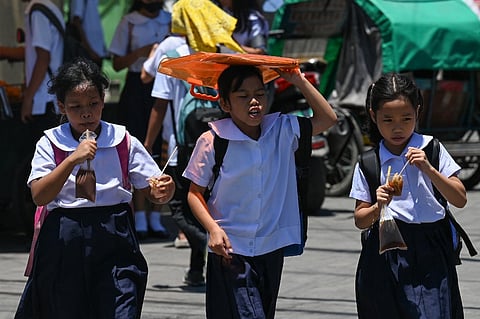
- NEWS
- the EDIT
- COMMENTARY
- BUSINESS
- LIFE
- SHOW
- ACTION
- GLOBAL GOALS
- SNAPS
- DYARYO TIRADA
- MORE

Children born from 2020 in the Philippines are seen to live through more heatwaves, floods, droughts, and crop losses than their grandparents or those born sixty years ago.
According to a study conducted by a non-profit organization Save the Children Philippines (SCP), Filipino children born now are going to suffer 4.9 times more severe heatwaves, 2.3 times more river floods, 1.2 times more droughts, and 1.5 times more crop losses than their grandparents.
Under current pledges, children born in 2020 will face seven percent more wildfires, 26 percent more crop failures, 31 percent more droughts, 30 percent more river floods, and 65 percent more heatwaves than if global warming were stopped at 1.5°C.
With that, the SCP has urged the government to take immediate action to help children in adapting to a climate-changed environment, protect children's well-being from the impacts of climate devastation, and prioritize them and vulnerable communities on the government agenda, finances, and resources.
Rex Abrigo, SCP's environmental health advisor, stressed the urgency.
“The effects of climate change exacerbate existing disparities and disproportionately harm underprivileged populations,” Abrigo said.
“We call for enhanced accountability from governments, corporations, and international organizations to protect children's rights,” he added.
Through its Generation Hope campaign, the leading child rights organization is stepping up its efforts to make sure that the Climate Accountability Bill is passed and that policies and services that are child-friendly are included.
The Climate Accountability (CLIMA) Bill, world’s first climate accountability bill, will hold those responsible for degradation of the environment accountable and allocate resources to mitigate the effects of climate change.
The proposed CLIMA Act, which was filed a week ahead of the COP28 climate talks in Dubai, is dubbed by the bill’s authors and climate groups as the first of its kind to officially recognize the concept of corporate climate accountability by a state.
If passed, the bill will mandate businesses to prevent and address possible climate harms their operations may cause, and reduce their planet-warming greenhouse gas emissions.
Just last week, the Philippines experienced severe heatwaves that led to cancellation of in-person classes of nearly 4,000 schools nationwide.
The country’s weather bureau said that high heat index from 42 to 45°C is dangerous to health and can lead to heat-related illnesses.
“Filipino students bear the brunt of the scorching heatwaves. Their classrooms are not heatwave-proof, and their class schedules have been altered, disrupting their studies for the entire year,” SCP said in a statement.
“Heatwaves also have an impact on children's physical and mental health, impairing their ability to concentrate or focus in school. Others caught coughs and colds and may not be able to rehydrate as regularly as they would want due to limited school baon,” it added.
On the global front, climate change has been raising global temperatures and causing unprecedented heatwaves, with more countries experiencing hotter days more frequently, SCP pointed out.
Climate change and poverty threaten one-third of the world's children, or 774 million, simultaneously, SCP furthered.
